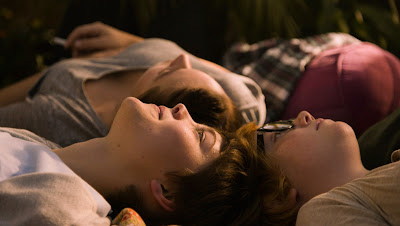Doctor
Strange (2016): Written by John Spaihts, Scott
Derrickson, and G. Robert Cargill, directed by Scott Derrickson. Starring:
Benedict Cumberbatch, Chiwetel Ejiofor, Rachel McAdams, Benedict Wong, Michael
Stuhlbarg, Benjamin Bratt, Scott Adkins, Mads Mikkelsen, and Tilda
Swinton. Running Time: 115 minutes.
Rating:
3/4
The
shared Marvel cinematic universe has become such a brand of its own at this
point, it’s near impossible to review any of its constituent parts in isolation
from each other. It also means that
reviewing these things quickly gets very rote- they nearly all have identical
strengths and weaknesses, so what you say about one can easily be applied with
little alteration to most of the others.
Doctor Strange does not do
much to buck this trend, but thankfully it still employs enough visual panache
and is more than fun enough to rank it among Marvel’s better origin
stories.
When
we first meet him, Strange is living the life of a slightly classier Tony Stark-
exceedingly brilliant, wealthy, part of the upper strata of city life, and a
bit of an arrogant prick. He’s perfectly
content in his sarcastic discontentedness until a bad car accident (almost
comically bad- you’ll see what I mean when it happens) leaves him with such
considerable nerve damage in his hands
that his high-flying surgical career, and with it the glitzy lifestyle
he loved so much, is effectively over.
Increasingly
desperate and bitter, he bankrupts himself on increasingly experimental (and
extralegal) and finally drives away his only real friend, Christine (a
criminally underused Rachel McAdams). He
finally gets a tip-off from someone who miraculously made a full recovery from
similar damage, which leads him to Kamar-Taj in Nepal. He expects to find a group of brilliant
doctors working beyond all bounds of regulated science. What he actually finds is the Ancient One
(Tilda Swinton), a powerful sorceress charged with protecting the Earth from
what lies beyond all bounds of this particular dimension. Faced with the chance to remake himself into
more than what he was, Strange commits himself to learning the magical arts and
begins to train under the Ancient One.
Like
with most origin stories, Strange’s journey of discovery is a fun time. His lessons are aided by two of the Ancient
One’s strongest acolytes, Mordo (Chiwetel Ejiofor), and the librarian Wong
(Benedict Wong). All in all this is a
great and talented cast having a hugely fun time, and the film keeps itself pretty
light most of the time. This is also a
half-strike against it, since the movie would have benefited immensely from a
deeper dive into the struggle of a coldly scientific mind forced to confront
direct evidence that what it previously thought to be “The Truth” was way
off.
But,
Marvel movies never do want to get bogged down in heavy topics, since no one
buys a ticket to a Marvel feature for an in-depth examination of the
existential. What IS more problematic is
the continued Achilles’ heel of this entire universe; weak villains with rather
paltry evil plans.
Don’t
get me wrong, Mads Mikkelsen looks great and is suitably intimidating as
Kaecilius, a former pupil of the Ancient One’s gone rogue, but his plan is just
another rendition of Been There and Can We Not Do This Again please? It’s dropped on Strange (and us) in a clunky
bit of exposition that breaks up what had otherwise been a solid and really
cool action scene.
It’s
all par for the course with most entries into the superhero genre, but I’m
still waiting for one of these things really brake with standard formula and
play for more exotic stakes. Oh
well. No matter. For what it is, Doctor Strange is another well-above-average entry into the growing
Marvel canon, as its stunning visuals representing the various dimensions and
universes Strange interacts with and its top-notch casting push it well above
its storytelling flaws. Toot-toot, all
aboard, for the Marvel train still ain’t stopping.
-Noah Franc


